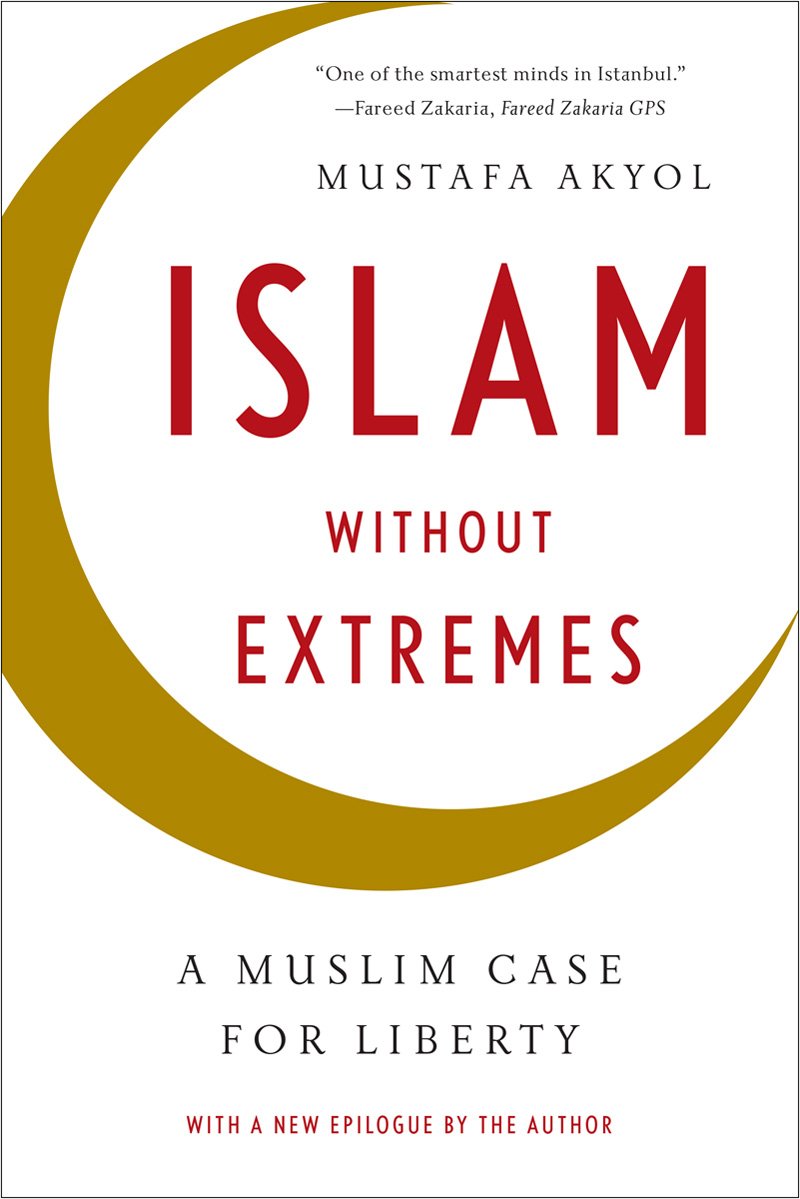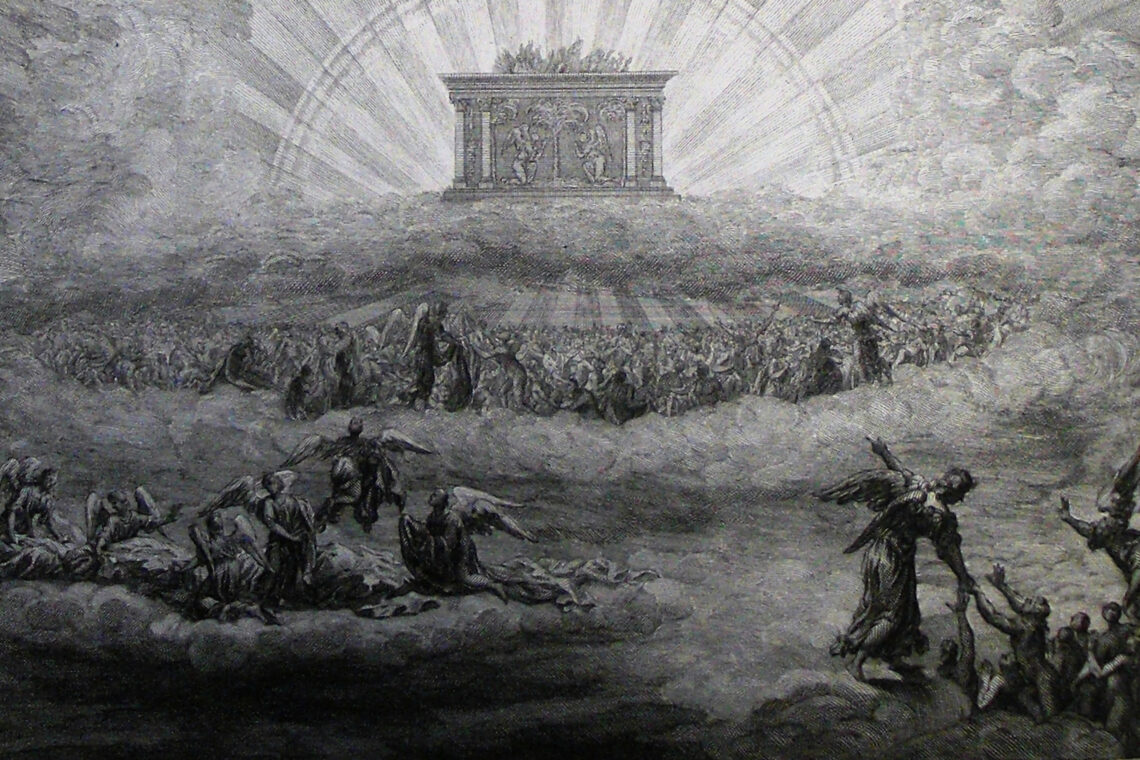I finally got to reading Turkish journalist Mustafa Akyol’s book, Islam Without Extremes: A Muslim Case for Liberty (2011). It is a well-researched book, very smart, and daring in a way I hadn’t considered before. Akyol argues that a Muslim can stay within the boundaries of the faith and still enjoy all the freedoms available in secular Western democracies. All that is required is for him or her to be bound by the word of Allah, as revealed in the Koran. And since the Koran by itself cannot meet all the Muslim’s needs for guidance, a careful use of the Hadith (the authorized collection of sayings about the words and deeds of Prophet Mohammed), one that conforms to the message of the Koran, is acceptable.

The Hadith, however, must be treated warily, for it is not of divine origin; more often than not, it expresses the political disputes that emerged after the death of the Prophet. A saying about beating childen at the age of ten if they don’t start praying or one that orders the killing of Muslims who leave their religion are innovations on the Koran and so cannot be taken seriously. The Koran says nothing about the harsh and brutal punishments associated with the shari`a. It doesn’t recommend the political regime of the caliphate, one that is endlessly and sometimes violently championed by many Muslims. God never calls for moral cops such as the mutawi`een that patrol the streets of Saudi Arabia. And even if the tough laws of the shari`a made sense in the Middle Ages, when law enforcement was sporadic at best, nations now have police forces that can maintain order without having to resort to barbaric punishments.
The Koran is all a Muslim needs, really. Unlike the New Testament, which tells the story of Jesus, it is the uncorrupted word of God that preserves all previous revelations. “We have sent down the book to you with truth, confirming and conserving the previous books” says the Koran. Mohammed, in addition, is “only a warner and a bringer of good news.” Allah tells him: “We did not appoint you over them as a keeper, and you are not set over them as their guardian.” The question of belief is God’s problem, not Mohammed’s. “It is the truth from your Lord,” Allah says, “so let whoever wishes have belief and whoever wishes be an unbeliever.”
The generations that came after the Prophet, consumed as they were with their worldly quest for power, wanted more. They argued over the nature of humans, whether they were endowed with free will or not. Was the Koran created or was it the uncreated and eternal word of God? If it is uncreated, then that means it can’t be interpreted, only applied, as Rémi Brague explained in his book,The Law of God: The Philosophical History of an Idea. Thinkers like Al-Farabi (Alpharibus), Al-Kindi (Alkindus), Ibn Sina (Avicenna), and Ibn Rushd (Averroes) believed that freedom is the ideal, but a religious scholar (`alim) like Ahmed ibn Hanbal, born in Baghdad but who spent time in the Hijaz (Saudi Arabia), considered human reason to be a dangerous innovation, a bid`a. For him, the Koran and the Hadith must be taken literally. He refused to eat watermelons because there is no hadith showing that the Prophet had eaten them. It’s that simple.
The Hadith, considered sacred, turned into a golden strategy to tie the Muslim mind in tradition. After Mohammed ibn Idriss al-Shafi`i (d. 820) succeeded in elevating the Prophet’s life to a status of sacredness comparable to that of the Koran, everyone rushed to come up with a hadith to support his views or lifestyle and to criminalize difference of opinion. Some used hadiths to attack groups that called for suspending judgment on matters of faith (Murji`a) and upholding free choice (Qadariyya), even though the Murji`a and the Qadariyya didn’t exist when the Prophet was alive! Such hadiths were among the hundreds of thousands of forgeries that circulated. As the number of hadiths proliferated, a system of authentication, relying on a chain of transmitters, called isnad, was devised to sort out real hadiths from fake ones. Still, the People of the Hadith (Ahl al-Hadith) introduced new punishments, such as stoning adulterers, punishing alcohol drinkers, and killing apostates. Eve, treated as Adam’s companion in the Koran, was portrayed as a deceiver and women as cunning and untrustworthy. Hadiths were found to ban painting and sculpture. Jihad was promoted and the world was divided into the Abode of War and the Abode of Islam.
The Hadith has become such an integral part of Islam that one can’t make sense of the Koran without it, which is, of course, a major problem. Still, Hadith critics didn’t give up at first and the war of ideas carried on. The Abbasid caliph Al-Mamun, founder of the House of Wisdom, a champion of Greek knowledge and the rational theologians known as Mu`tazilites imposed the mihna, a sort of inquisition, to enforce the theory of the createdness of the Koran. It proved to be a fatal mistake. His policy lasted 16 years before it was overturned by Al-Mutawwakil and power was transferred to the Hanbalis and the Traditionists who wasted no time in unleashing their fury on their society. “They began to raid the houses of the commanders and of the common people,” wrote Ibn al-Athir in his world history, Al Kamil fi Attarikh, “and if they found wine they poured it away, and if they found a singing girl they beat her and broke her instruments. They hindered buying and selling and delayed men who were walking along with women and youths, to question them about their companions. If the answers failed to satisfy them they beat the men and dragged them to the chief of police and testified about their immoral acts. The Hanbalis wrought discord upon Baghdad.” It is this kind of Islam that Mohammed ibn Abd al-Wahhab revived in the Arabian Peninsula in the 18th century and is now the official doctrine of Saudi Arabia.
In addition to promoting the Traditionists, Al-Mutawwakil instituted a new form of desert feudalism, the iqta` system, giving power to landowners and disenfranchising merchants who, by necessity, must be open minded to engage in trade with strangers. In the arid lands of Arabia and much of the region, that meant encouraging the kind of conservatism reflected in the hadith that says: “Every novelty is an innovation, every innovation is an error, and every error leads to Hellfire.”
Akyol thinks its time to reclaim the Islam of merchants and adopt the Koran as the main guide to the faith to get out of the impasse that seized Muslims during long centuries. Nations should be free to choose political systems that make the best sense to them. As already mentioned, the Koran says nothing about a caliphate. In matters of faith, the philosophy of the Murji`a, the group of Muslims who refused to pass judgment on fellow Muslims, is best. God wants people to listen to Him and do as he tells them, but most of the sins listed in the Koran are not punishable crimes, except for those committed against people (such as murder, theft, false accusations, and adultery). For example, it appears as if the fahisha (pre-marital sex maybe?) is a sin only, but adultery (zina) is a crime. The Koran doesn’t call for the murder of those who abandon Islam. “The truth,” it states, “is from your Lord, so let him who please believe, and let him who please disbelieve.” It also talks about “those who believe then disbelieve, again believe and again disbelieve, then increase in disbelief,” clearly implying that options are open. Even if the Koran recommended the death of apostates, it would be barbaric to do so now. The Torah and the Christian leader St. Thomas Aquinas both recommended death to apostates, but no nation in the world, outside the world of Islam, carries out such punishments today.
Avoiding ignorant people is better than punishing them, the Koran says. “When you hear God’s revelations disbelieved in and mocked at, do not sit with them until they enter into some other discourse; surely then you would be like them.” Also: “When you see those who enter into false discourses about Our communications, withdraw from them until they enter into some other discourse.” Finally: “When they hear idle talk they turn aside from it and say: We shall have our deeds and you shall have your deeds; peace be on you, we do not desire the ignorant.” God knows that it is hard to convince everyone: “What has been sent down to you from your Lord is the Truth, but most people have no faith.”
Akyol sees hope in the contemporary Turkey, reading the rise of a pious merchant class that wants God and freedom as the restoration of the order that Al-Mutawwakil decapitated with his iqta` system. Under Turkey’s Islamist Justice and Development Party (known by its acronym AKP) the Hadith is being reviewed and some are calling for an Islam of the Koran only. These Koranists (qur’aniyyun) are generally condemned by Sunnis (so called because they follow the Sunna, or way, of the Prophet, as conveyed by the Hadith), but they are not a new phenomenon in Islam, as Aisha Y. Musa shows in her book, Hadīth as Scripture: Discussions on the Authority of Prophetic Traditions in Islam (2008). In fact, opposition to the Hadith started as soon as Al-Shafi`i (d. 820) introduced the concept of “the duality of revelation” (Koran and Hadith). Al-Shafi`i believed that a Muslim can’t practice without the help of the Sunna, but the opponents of the Hadith feared the Hadith might compete with the Koran. Scholars like the Andalusian Ibn Hazm tried to differentiate the Koran as recited revelation (wahy matlu) from the Hadith as non-recited revelation (wahy la matlu). For such Muslims, the Hadith is an extra-Koranic tradition, while the Koran alone is quite sufficient to guide and inspire a Muslim.
These Koran-only Muslims were like the Jewish Karaites who opposed the codification of the Oral Law in the Mishna, one of two books of the Talmud. Islam’s great caliph, Umar ibn al-Khattab, may have been aware of these Jewish disputes when he discouraged the use of legends about the prophet and recommended that people stick to the Koran only. The second most revered figure in Sunni Islam objected to writing the Hadith because of the fear it might distract from the Koran. In Ibn Sa`d’s Al-Tabaqaat al-Kubra, Umar is reported to have recommended the baring of the Koran and reducing the use of legends about the Prophet (“jarridu al-qur’an wa aqillu al-riwayat”). According to authentic hadiths, he even disallowed the feverish Prophet on his deathbed to leave written instructions behind. “They have the Koran and the Book of God is enough for us,” he exclaimed. In fact, even the Prophet himself is reported in the Hadith to have ordered his followers not to write anything that is not the Koran and to erase anything that has already been written.
These Koran-only Muslims were also worried that the Hadith might be offensive to reason and thus heap ridicule on their beloved religion. For instance, thinking Muslims found hadiths that say “If a fly falls in the drinking cup, dunk it, because one wing carries poison and the other carries the antidote” or the one that claims that humanity was born from Adam’s back offensive to reason and could make Islam look bad. Their questioning continued some two centuries after the death of Al-Shafi`i, as the case of Ibn Hazm (d. 1062) shows. A Traditionist like Al-Khatib al-Baghdadi (d. 1071) published his book Taqyid al-`Ilm (The Binding of Knowledge) to make a case for the writing of Hadith precisely because opposition hadn’t died out. In the course of history, though, Al-Shafi`i won and the Hadith acquired its sacred status.
New critics, generally known as Ahl al-Koran, emerged in recent times to uphold the anti-Hadith tradition. A good example is Rashad Khalifa. This man first gained fame by proving, through the use of computational models, that the Koran is of divine origin. For his work, he was praised by Al-Azhar, the major center of learning in the Sunni world, in 1976. But praise soon turned to hatred when he wrote against the Hadith, comparing the added material to “Satanic inventions.” He was killed in 1990, outside the mosque he founded in Tuscon, Arizona.
Khalifa cites numerous verses in the Koran stating that the Koran contains all the answers and that it is sufficient. Verses such as “We did not leave anything out of this book, then all will be summoned before their Lord (for judgment). Those who do not believe our verses are deaf and dumb: in total darkness. God sends astray whomever He wills, and directs whomever He wills in the right path” and “Shall I seek other than God as a source of law, when he revealed this Book to you fully detailed . . . The word of your Lord is complete in truth and justice” prove without a doubt that the Koran is all a Muslim needs. Moreover, Mohammed’s role is to convey God’s message and no more: “Do not move your tongue (O Muhammad) to hasten the revelation of the Quran. It is we who will put it together as a Quran. Once we reveal it, you shall follow it. Then, it is we who will explain it.”
The Qur’aniyyun have a good case if they think that their impressionistic scripture allows for more flexibility and freedom than does Al-Shafi’i’s dual revelation. The word of God must surely be supreme. But what makes the Koran liberating can also turn it into a license for violence against unbelievers. The Hadith itself includes sayings that show the Prophet was not sacred. And if Hadith critics object to the writing of oral traditions, why don’t they apply the same principles to the Koran itself? Clearly, as its name indicates, the Koran (qur’an) is meant to be recited, not read quietly, as one does with a novel today. If the Koran was meant to be “bound” (muqayyad) through writing, then the Prophet himself would have overseen the process. He would not have gambled the future of his message to people he didn’t know or couldn’t control.
In the end, we keep finding ourselves returning to what the late Moroccan philosopher Mohammed `Abid al-Jabri called “the Age of Writing” (`asr at-tadween) that emerged in Iraq some two centuries after the Prophet’s presumed death in 632. That’s when Islam, with its all its scriptures, was gradually forged out of religious fragments, distant memories, and myths about noble ancestors in the desert villages and towns of Arabia.




I have been surrounded by Muslims for many years now where I live. I have to admit that I do find Islam a viable religion, but I do have a problem with following the Hadiths. I feel the Quran was written to be stand alone and does not need all those, what I see as personal interpretations. I could possibly lean more towards Islam without the Hadiths.
Islam is not a religion of violence, it’s a religion of peace, but i will say the real peace and no other religion can be as peaceful as Islam. Just read the Quran and Hadith fully, and then arrange a debate over it. 100% certain all will be in the same supposition that Islam is the religion of love and peace. https://play.google.com/store/apps/details?id=com.dawateislami.molanailyasqadri
After many discussions with the critics, I received many criticisms of simple Islam, among which were many arguments based on Quran. I listed the arguments and analyzed them in detail in the following page: http://simpleislam.weebly.com/5/post/2013/11/criticisms-of-simple-islam.html